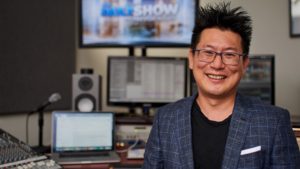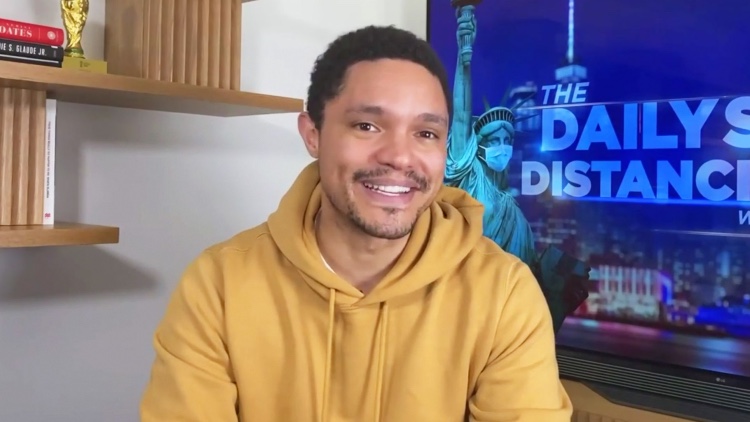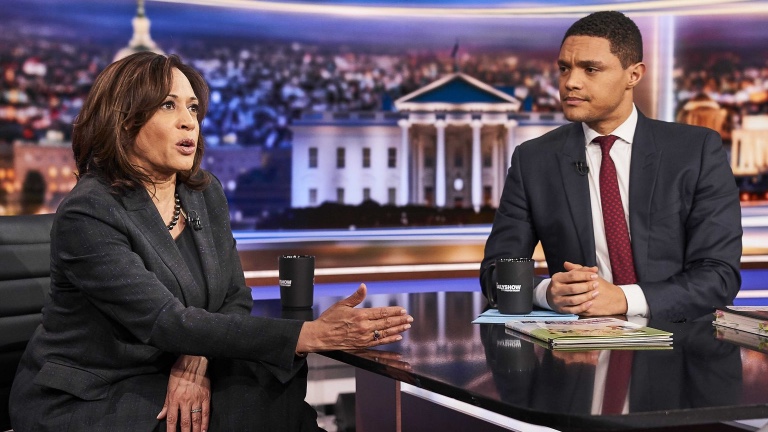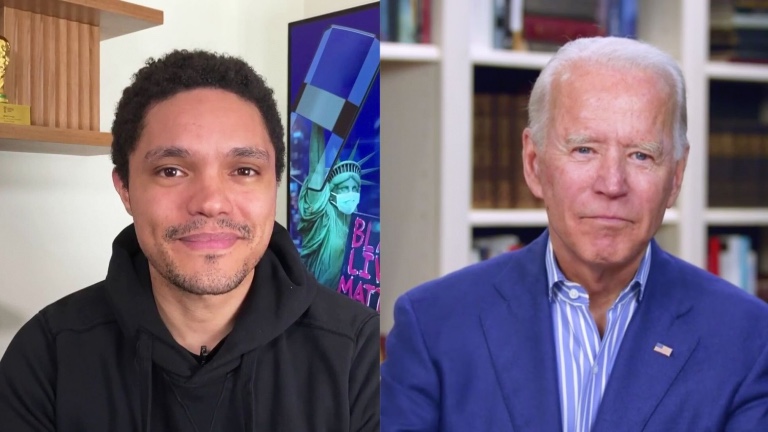 When the COVID-19 pandemic hit in March and productions ground to a halt, one show stepped up and quickly figured out a way to come back, and that was Comedy Central’s The Daily Show with Trevor Noah. It quickly pivoted and was back as “The Daily Social Distancing Show” with Noah recording the show from his own home in a much more laid-back fashion that allowed him to get a lot more prominent interview guests, since they no longer needed to travel to the show’s New York City studio.
When the COVID-19 pandemic hit in March and productions ground to a halt, one show stepped up and quickly figured out a way to come back, and that was Comedy Central’s The Daily Show with Trevor Noah. It quickly pivoted and was back as “The Daily Social Distancing Show” with Noah recording the show from his own home in a much more laid-back fashion that allowed him to get a lot more prominent interview guests, since they no longer needed to travel to the show’s New York City studio.
Noah’s new direction became such a popular show to appear on that it expanded to 45 minutes from its normal 22 minutes, allowing room for longer interviews and even better, more ads! Starting this week, The Daily Show is expanding to five nights a week in order to cover the Democratic National Convention kicking off the three months leading to the Presidential Election in November, when the show has frequently thrived in the past.
As luck would have it, this is the first year since Noah took over hosting from Jon Stewart that the show was nominated for an Emmy for its writing, as well as in two technical categories: film editing and sound mixing.
Below the Line spoke with head editor Mike Choi about how the show runs and how his role(s) have changed with the new direction the show has taken post-COVID.

Mike Choi: About three and a half years ago, and prior to that, I was making feature films, documentaries. I started out as an animator, before moving into editing. I really loved what I was doing before this, and I never thought that I would take a staff job as a position, but I just fell in love with the show, and I fell in love with the people. I’ve never even thought about leaving since coming.
BTL: I assume you have a pretty big team, so how does your crew divide up the work? Are you all working on a single episode each day and splitting up who does what on a show?
Choi: It’s split up. A lot of times, there are some field pieces that are edited over a course of time, so those are always in progress, and it’s really a day-to-day thing. There are so many variables and challenges into making a show every day that what you’re doing one day is certainly different than another. Certain things with cutting interviews to simple newsreels to very complicated graphics for events and stuff like that, so it is a large team and it’s definitely a team effort, and it’s like you get set up in the morning and it’s a mad scramble and then it all comes together.
BTL: Before social-distancing, was Trevor taping the show at a certain time every day or was he able to tape multiple shows or interviews the same day? What was the schedule like to get the show on the air by 11pm?
Choi: We would tape one show per day, and generally I’d say between around six and seven [PM]. You want to tape as late as you could, just so you could have the most recent news and most updated show. Of course, with fast moving news, like we have now, it’s not uncommon at two o’clock to get a call and be like, “Throw away everything we did today. This just happened. We’re moving course here.” So those are the most challenging days, certainly, where the news changes drastically in the middle of the afternoon.

BTL: The Daily Show was one of the fastest shows to switch gears when the pandemic hit. How did that change things? Did everyone have a system at home they could use for the editing to make the switch-over happen so quickly?
Choi: Certainly at the start of the lockdown in March, it was a bit overwhelming. Luckily the editors, most of us, had systems at home that we could use, and at that point, you have to think, “Okay, we have to completely change every aspect of how we do this show,” so it’s a lot of thought and adaptability. The big change that happened is when we stepped back and accepted our limitations, we almost embraced the challenges. At that point, a lot of opportunities presented themselves, because with a clean slate, you really do think, “What is the show that we want to make? What are we going to do?” That brought up a lot of opportunities for how we change, how we do graphics, how we do sound effects.
Even some of the bits that Trevor can do. He does these act-outs now where he plays multiple characters, and all that’s done in the edit. These were all things that we were not doing prior to March, and it was all just a constant state of adapting and flexibility. Luckily, the team of editors we have, they’re just the best. They really are the best people that are incredibly talented; they adapted and [were] completely willing to do a different workflow. They were willing to adapt to new technology, and not only that, the other complications that come up when you do a show remotely like this is, in terms of the edit specifically, we find that we’re doing a lot more design work and the editors have to be graphic savvy or do audio mixing and sound design, color creating, things that you don’t normally do on a day to day basis. It was the willingness of the entire team to do whatever was necessary to get these shows back on that I think we were able to get back on the air so quickly
BLT: I assume Trevor has to do most of his own camera work, so how much communication happens between him and your department while filming either before or even during interviews? How does he know that you’re getting the pieces that you need for the edit?
Choi: There’s a lot of communication through every avenue, whether it’s Zooms and emails, texts. We’re utilizing it all to communicate throughout the day — we’re all in communication in 10 different ways. To embrace this new technology, I think that’s how we’re getting people to be able to listen into the interviews or give notes while things are being shot using Zoom or FaceTime or however the different producers work. It’s been pretty good and fairly seamless.
BTL: It’s a little deceptive since when you watch the show, you just assume that he’s doing everything himself and you forget that there are producers and others around him helping to get the show done. Have you been able to keep the same team and general workflow while shifting to this new way of working?
Choi: Luckily, they’ve been able to keep a lot of the same team throughout the process, yeah.

BTL: How is it different timing-wise? Is he able to do interviews at different times of day since you don’t have to wait for the guest at the studio and can talk to them on their own schedule?
Choi: Scheduling the interviews has definitely been a challenge in that, a lot of these people, they were not in the studio, so sometimes they’re on the West coast or different time zones and their schedule can be pretty rigid, especially for certain politicians and so forth. Now, it seems that we’re doing more interviews. We have sometimes two interviews on the show per day or per episode, and the schedule with them can sometimes fall early, and you schedule a lot of time to work on them. Sometimes, they could both happen late, and that’s a great example of the kind of challenges you just have to accept and just tackle.
BTL: Are you pretty happy with the set-up you have at home compared to the bay you had at the studio?
Choi: We all had our own bays, and obviously on a live show, they’re all ripped a bit differently in terms of how they communicate with the studio and the cameras and so forth. It wasn’t possible to replicate that set up, so every editor has different editing capabilities, in terms of their machines and how fast they work. That’s another thing that we just adapted and sped up the internet when we needed to, we sped up the RAM when we needed to, and now we’re in a position where we’re all up and ready to go. We do have 8 Avid edit bays that are available and working every day, and yeah, it’s a bit of a technical puzzle to try to figure out 8 computers, all on different OSs, all on different versions of Avid. You have to come together and be like, “All right, this is what we each need to do in order to get us all communicating together, so our computers can network together.” Took us a couple of weeks, but we’re there.
BTL: But you don’t have one central server that everyone can access, so how you able to get the files back and forth and still able to work in a timely fashion?
Choi: This is the process that is adapting still, as we’re talking. Even just this week, I was able to connect to my work computer so I can access some project files that are on that server, but generally, footage gets sent to all the editors from Trevor’s apartment. We all have access to it. It lives on the cloud and then we’re able to download the acts and the segments we need. They’re edited all remotely at our base, and then at the end, when we’ve gone through a review process and any changes, when they’re locked, it all gets sent to me and I assemble the final episode for output.
BTL: I assume Trevor’s getting more technically involved as well, just by necessity?
Choi: I think we all are, certainly. I feel like editors are technical, to some level, but when you start talking about internet speeds and BIT rates and all this stuff, it’s a different sort of technology. We’ve all had to learn things that we don’t feel comfortable with or that we didn’t do before, and again, it was just the willingness of the team to just adapt and do whatever was necessary, even if it was something that’s completely out of your wheelhouse.
BTL: Is there any word on when Trevor might get back into the studio even if it’s without an audience, as we’ve seen with other talk shows? Is that something you want to transition back to anytime soon or have you gotten adjusted to this new workflow/system?
Choi: I really don’t know the answer to that, but yeah, whatever is necessary. I think for the time being, we’re going to continue doing the social distancing show, but yeah, I don’t really know.
BTL: I think everyone is adjusting to working from home now, and once you get comfortable figuring out how to do that, some might wonder whether they need to go back. Have you had any conversations like that maybe you can just keep doing the show like this? Or are there other benefits from being at the studio?
Choi: There would definitely be benefits to being in the same place, and certainly I think, the way we were making the show prior to March, we had the team of true pros to put up the show that we’re all familiar with and love. Without an audience, we’ve had to adapt to ways to try to … For a comedian, I think, the audience provides a lot of energy and cues, and so to perform without an audience, a lot of that we’ve had to adapt to in the edit, in terms of how do you react after a joke if there’s not actually laughter? A lot of the editing that we do is for the purpose of trying to elevate a joke of punching in at this time or adding a graphic or a sound effect at that time or something, so they are very different shows. In making two shows that are so different, there’s a lot of flexibility to how we land in the middle. I feel completely comfortable going back into the studio, making the show that we were for the last three years. The way that we’re doing it now, I think we’re finding a way and we’re making it work, and anywhere in between, I think we can all adapt to whatever show we need to make.

BTL: The show is actually longer now at 45 minutes, so is that a very big change and something we might see continue?
Choi: Yeah, we expanded to 45 minutes, I believe in April, and yeah, there’s just more content now. For a lot of these interviews now they have quite a bit to say, so we’re able to let them play longer, and it just gives us a lot more opportunity to do more builds or fake ads, more sport content in the headline section.
BTL: We’re less than three months to the next Presidential Election with the conventions this week and debates to start soon, so do you generally have to add to the editing staff for this period? Were you working with Trevor for the 2016 election or did you join later?
Choi: I joined right after the election in December of 2016.
BTL: What’s involved with transitioning into what’s always a busy time for the show?
Choi: We’re getting started on some convention pieces, and I’m sure the content is going to ramp up steadily up until November, for sure.
BTL: What would you like people to get out of the “Socially Distancing” show if they read this interview and then go to watch the show right after? What’s something truly unique you want them to notice as far as the editing?
Choi: As far as the editing, in terms of this type of a show, the entire thing is edited now. Prior to this, there was generally a line cut and then they edit the segments within and editing within the line cut, but very quickly we realized that that old way of making the show wasn’t going to work for the “Social Distancing” show. The idea to edit every second of the show, every graphic gets added in and animated, every sound gets adjusted. It’s a tremendous amount of work that, at first, we were like, “I don’t know if we have time to do this every day.” Certainly, when we went to 45 minutes, it presented another challenge, but I really want to just stress that this team of editors is just fantastic, they really are, and that the skill set is wide and broad.
Everything from doing motion graphics to color grading, we’re willing to do these things, and we needed to in order to be able to get this fully-edited show out the door. In terms of the way it looks, that was also something that we needed to be flexible to adapt to. I think if you look at the style of the show now, it will seem familiar to certainly a younger audience, and if you look at how a lot of the videos that go viral now, the style that they’re edited, they never had a live audience.
It’s almost like that format, that genre, evolved without an audience in mind and that’s where we saw that direction, and we were like, “I think we need to move the show in that sense.” As long as we don’t have the audience, in order to really take advantage of [it] … “If we are editing the show, let’s REALLY edit the show. Let’s do everything we can from every aspect of it, from sound to picture and everything in between, to make the show that we’re trying to.” So I guess it was really just the embracing of the editing of the full episodes.
The Daily Social Distancing Show with Trevor Noah airs weeknights at 11pm on Comedy Central.





